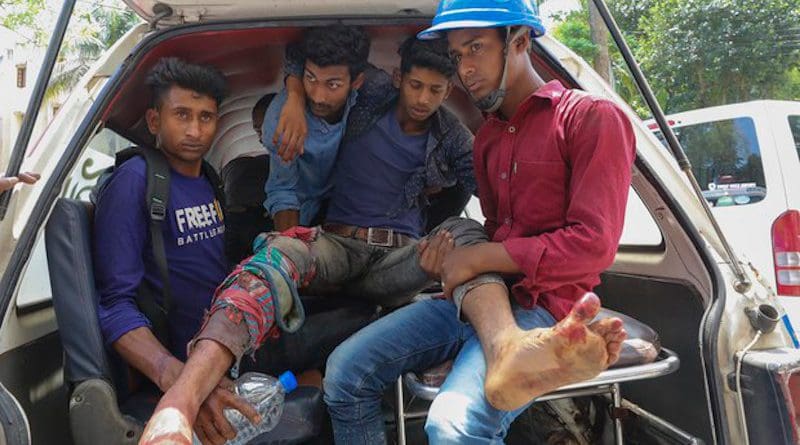Bangladesh: Police Shoot Dead Five Protesters At China-Financed Power Plant
By BenarNews
By Sharif Khiam
At least five people were killed and dozens injured Saturday in southeastern Bangladesh as protests over pay and working conditions at a coal-fired power plant turned violent and police fired on angry workers to protect Chinese nationals on the premises, officials and witnesses said.
The incident took place at a sprawling, still-under-construction facility in Banshkhali sub-district of Chittagong, some 292 kilometers (181 miles) southeast of Dhaka, co-owned by a Bangladeshi conglomerate and two Chinese companies.
“Five power plant workers died at the Banshkhali Power Plant incident. They died as police had to fire when hundreds of angry workers, instigated by some local people, set nine lorries and vehicles on fire, attacked the police and were attempting to attack the Chinese nationals working on the project,” said Md. Zakir Hossain Khan, a senior police official in the Chittagong region.
He said relations between 900 Chinese nationals and some 4,000 local people working at the plant were strained over outstanding wages and demands for reduced hours during Ramadan, the Muslim fasting month, which began last week.
“There are problems of the local workers with the Chinese workers and officials,” Khan told BenarNews. “If the police had not fired, the unrest could have led to very, very serious incidents.”
Workers met with Chinese project officials Saturday to try to settle the disputes, but “some local people entered the project site, breaking the boundary walls, and incited the workers to go on a rampage,” Khan said.
BenarNews attempted to contact S. Alam Group, a Chittagong-based conglomerate with a 70 percent stake in the project, for comment, but did not receive any response.
In a statement Saturday, the Bangladesh Workers’ Rights Council said 100 workers were injured in the firing, with many of them in critical condition.
“The number of deaths may increase as many of injured workers have been trapped inside the power plant,” said the statement, adding that police had not given them treatment.
Khan denied this allegation.
Moshiur Rahman, an employee of a Bangladeshi company at the site, told BenarNews he had to scale a wall to flee the scene amid intense firing by the police.
“The Chinese were supposed to pay the outstanding wages. The workers demanded reduced working hours during Ramadan,” he said, adding that they were “trapped inside” as the plant was encircled by police, the elite RAB police unit and members of Border Guard Bangladesh.
“The police shot at us to save the Chinese nationals. I was inside the power plant complex when the violence erupted. The scale of firing was so intense, and I feared that there would be scores of deaths,” said Rahman.
“I survived by jumping outside, scaling the wall of the plant,” he said.
“The situation is calm now,” he added.
Saturday’s incident was not the first spilling of blood over the facility. Locals – mostly fishermen and workers on salt and fish farms – waged a massive protest when the 3,000-acre project was approved in 2016, fearing that it would jeopardize the livelihood of people in the area.
At the time, police fired on crowds, killing four.
Seventy percent of the U.S. $2.49 billion cost of the facility was financed by China, according to information on S. Alam Group’s website. The plant had been scheduled to begin producing 1,320 MW of power in 2023.
“But I think they cannot go for production by the deadline,” Mohammad Hossain, director general of the power cell, a division of the Ministry of Power and Energy and Mineral Resources, told BenarNews.
Two Chinese firms, SEPCOIII Electric Power Construction Corporation and HTG Development Group, have a 30 percent stake in the project, according to ministry data.
Hossain said the government could not intervene in labor affairs, which he said were the jurisdiction of the project’s private owners.
“We can only intervene when they violate terms and conditions of building the power plant,” he said.
The Bangladesh Workers’ Rights Council called for an investigation of the incident, punishment for those responsible and compensation for the families of the deceased.
Bangladesh is building several China-financed coal-fired power plants, although critics say the nation’s power capacity exceeds current demand, and coal is more expensive than other energy sources because the country has to import it.
In September 2020, the government signed a deal to build a second 1,320 MW, coal-fired power plant at Payra in coastal Patuakhali district, near the Sundarbans, one of the world’s largest mangrove forests.
Work on the first Payra plant was briefly halted in June 2019, after a Bangladeshi worker fell to his death from a terrace, and a Chinese worker was killed in a subsequent brawl. It was the first time a foreign worker had been killed in a clash at a work place in Bangladesh, a labor leader said at the time.

